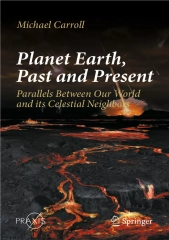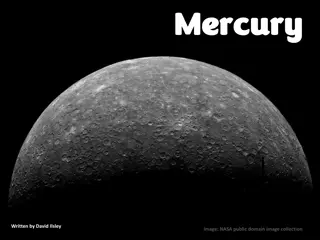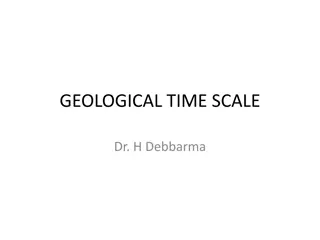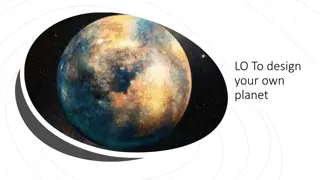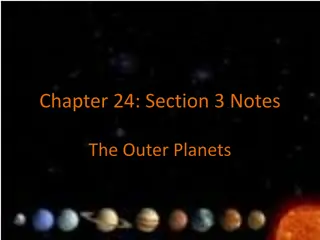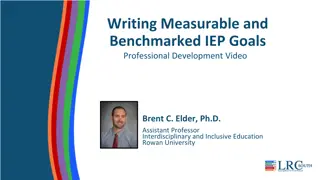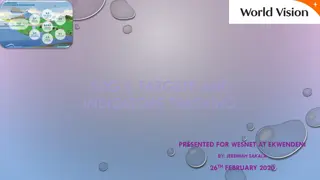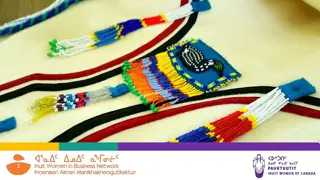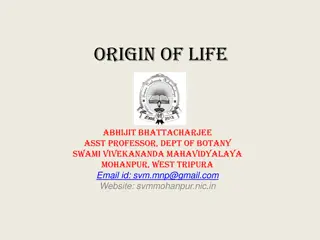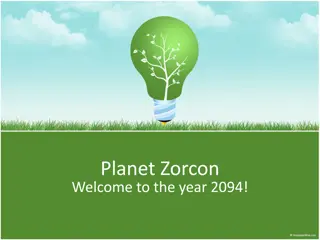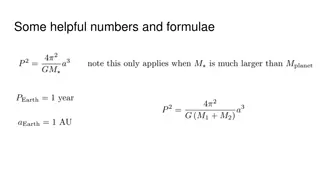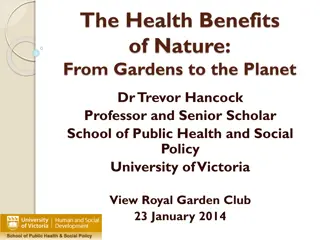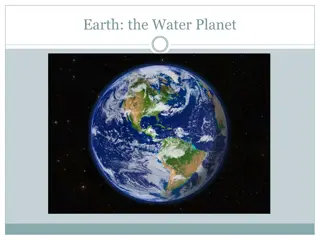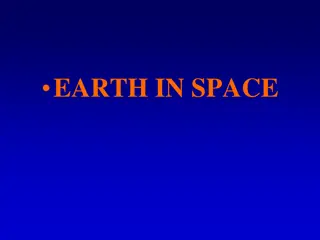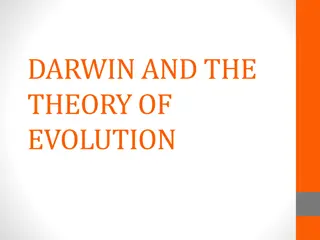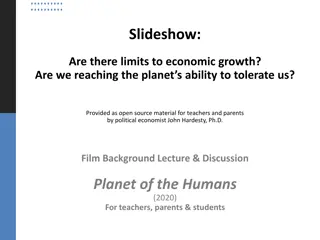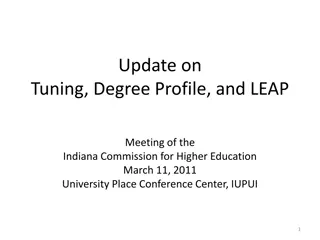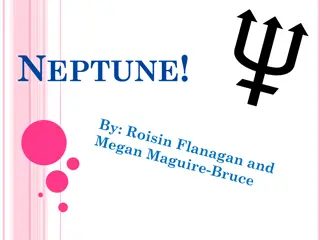Exploring Life-Planet Co-Evolution: Goals and Initiatives
A community dedicated to understanding the co-evolution of life and planet through rock records, biodiversity, genome databases, and modeling. Goals include unraveling major biological innovations and predicting life evolution on other worlds. Initiatives involve collaboration, outreach events, seminars, and speaker series led by experts in various fields.
Download Presentation

Please find below an Image/Link to download the presentation.
The content on the website is provided AS IS for your information and personal use only. It may not be sold, licensed, or shared on other websites without obtaining consent from the author. Download presentation by click this link. If you encounter any issues during the download, it is possible that the publisher has removed the file from their server.
E N D
Presentation Transcript
Who are we? What are our goals? A community dedicated to understanding life-planet co-evolution recorded in the rock record, in biodiversity, in genome databases, and modeled in silico or by lab proxy studies. To understand how major biological innovations shaped the evolutionary path of our integrated life-planet system. To discern the rules of co-evolution so as to predict how life could evolve on worlds other than our own and inform how we search for it. A community that will develop a science of living worlds by viewing life-planet co-evolution through one lens asking: What environmental pressures, biological mechanisms, and evolutionary opportunities: 1) gave rise to cellular life? 2) caused life to expand to planetary scale? 3) led to the emergence of eukaryotes? 4) favored the transition from single cells to multicellularity?
Who are we? NASA Point of contact: Becky McCauley-Rench co-Leads: Ariel Anbar, Arizona State Mary Droser, UC-Riverside Bet l Ka ar, UW-Madison Frank Rosenzweig, Georgia Tech Steering committee Don Burke-Aguero, U Missouri Shelley Copley, CU Boulder Mark Ditzler, NASA Ames Ben Gill, Virginia Polytechnic Trinity Hamilton, U Minnesota Tim Lyons, UC Riverside Niki Parenteau, NASA Ames Cynthia Silveira, Univ Miami Daniel Stolper, UC Berkeley Steve Vance, JPL Early career investigator committee, 2023 Christina Buffo, Gatech Jaime Cordova, UW-Madison Bruno Cuevas, UW-Madison Ethan Edmans, ASU Brandon Hasty, ASU Adam Hoffman, UCR Charles Ross Lindsey, Gatech Kathryn Rico, ASU Rachel Surprenant , UCRr
What are we doing to reach our goals? Outreach From our Charter LIFE will bring together paleontologists and geobiologists, geochemists and biochemists, molecular biologists, and evolutionary biologists in an intellectual environment that is collegial and scientifically rigorous. Presence at AbGradCon 2023 6 Session Proposals to AbSciCon 2024 Seminar series We welcome theoreticians and experimentalists investigating evolution of catalysts, pathways, networks, and compartments across scales from macromolecules to ecosystems in ways that inform the search for past and presently inhabited worlds and their biosignatures.
What are we doing to reach our goals? LIFE RCN Speaker series Led by Early Career Committee Date Speaker Field 5 June Maria Rebolleda Gomez, UC Irvine Microbial Communities Showcases research by leaders and emerging leaders in Astrobiology. 10 July Paula Welander, Stanford Archaea 1stMonday of the month,1-2 pm EST, live- streamed 30-40 min talks followed by moderated Q&A. 18 Sept. Steve Vance, JPL Ocean Worlds 2 Oct. Patricia Sanchez-Baracaldo, University of Bristol Origins of Photosynthesis Open to all who share an interest in Earth-life co-evolution from early cells to multicellularity. 6 Nov. Galen Halverson, McGill Geochemistry 4 Dec. Chinmayee Govinda Raj, NASA Ames Instr. Dev. & Space Biol.
What are we doing to reach our goals? Outreach LIFE member leadership at GRC, SMBE, AGU et al. Presence at AbGradCon 2023 6 Session Proposals to AbSciCon 2024 LIFE member leadership of local symposia, e.g., Spring 24 Suddath Symposium at Georgia Tech Evolution of Multicellularity & Cellular Differentiation
What are we doing to reach our goals? Outreach LIFE member leadership at GRC, SMBE, AGU et al. Presence at AbGradCon 2023 Session Proposals to AbSciCon 2024 LIFE member leadership of local symposia, e.g., Spring 24 Suddath Symposium at Georgia Tech Evolution of Multicellularity & Cellular Differentiation LIFE member leadership at NAS CAPS Ancient Life on Earth as a Guide for Alien Earths Prof. Bet l Ka ar, UWisconsin-Madison 24 October 2023 Beckman Center, Irvine, CA Image: Peng, Adams, Fahrenbach, Ka ar. 2023. 145: 22483-22493.
What are we doing to reach our goals? Fall 2023 Virtual Workshop Nitrogen Cycling Across Planetary Scales October 18 and 20, 2023 Lead Organizers: Ben Johnson (Iowa State), Eva Stueeken (St. Andrews Univ) Synopsis: Life as we know it requires nitrogen, but how does our understanding of the N cycle inform our search for life in the universe? The goal of this workshop was to define key questions that should focus research in anticipation of the next generation of astrobiology exploration. Presentations covered planetary origins and formation, terrestrial planets, icy worlds, and evolution Attendees: 100 (day 1); 70 (day 2) Manuscript in preparation
What are we doing to reach our goals? Research ICAR 2021, PI: Bet l Ka ar, UW-Madison Metal Utilization across Eons (MUSE) https://museastrobiology.org/ Ariel Anbar1 (DPI), Anne Dekas2, Betsy Swanner3, Amanda Garcia4, Lance Seefeldt5, Bill Seyfried6, Kurt Konhauser7 1 Arizona State University,2 Stanford University, 3Iowa State University, 4UW-Madison, 5Utah State University, 6University of Minnessota,7 University of Alberta
What are we doing to reach our goals? Research ICAR 2021, PI: Bet l Ka ar, UW-Madison Metal Utilization across Eons (MUSE) MUSE focuses on the evolution of metal use on Earth - specifically, the biochemistry of carbon and nitrogen acquisition throughout time. MUSE conducts geochemical and biological investigations that involve ancient materials, modern experiments, and exploration of past and present natural systems.
What are we doing to reach our goals? Research ICAR 2023 Engine of Innovation: How compartmentalization drives evolution of novelty and efficiency across scales We define a compartment as a structure in which exchange of components with the surrounding milieu is restricted, often but not always, by a membrane or a protein shell. We hypothesize that compartmentalization flexibility and/or efficiency in acquiring, processing and conserving resources across scales from the molecular to the ecological. To test this hypothesis we will use theory and experiment to study an increasingly complex hierarchy of compartmentalized structures: 1. prebiotic aggregates, 2. problematic metabolites, 3. bacterial micro-compartments, 4. nested metabolic compartments 5. serial endo-symbioses, 6. microbial consortia. increases Jeff Cameron1, Shelley Copley1, Joshua Goldford2,5, Chris Kempes3, John McCutcheon4, Victoria Orphan5, Frank Rosenzweig6(PI), Alexis Templeton1, Boz Wing1 1CU-Boulder, 2Blue Marble SSI, 3Santa Fe Institute, 4Arizona State Univ, 5Caltech, 6Georgia Tech
Online community seminars and workshops! @LIFE_RCN youtube.com/@LIFE-RCN lifercn.org
A connected network of networks supporting current NASA Mission Science Prebiotic Chemistry and Early Earth Environments PCE3 JWST Perseverance Mars Sample Return NASA Luvoir/HabEx Astrophysics Division NASA APD LIFE: Early Cells to Multicellularity ECM OSIRIS REx The Nexus for Exoplanet System Science NExSS Europa Clipper Europa Lander Enceladus Orbilander Dragonfly NASA Earth Sciences Division NASA ESD Network for Life Detection NFOLD Network for Ocean Worlds NOW


![[PDF⚡READ❤ONLINE] Neptune: The Planet, Rings, and Satellites](/thumb/21522/pdf-read-online-neptune-the-planet-rings-and-satellites.jpg)
![[PDF⚡READ❤ONLINE] Planet Mercury: From Pale Pink Dot to Dynamic World (Springer](/thumb/21549/pdf-read-online-planet-mercury-from-pale-pink-dot-to-dynamic-world-springer.jpg)
